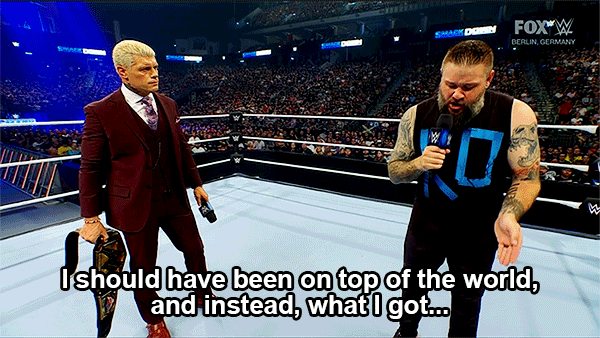A lot of Kevin’s feelings about the world title scene come from his Universal title win eight years ago, when HHH laid Seth Rollins out for Kevin to pin, literally handing him the title.
It’s clear that over time, he’s come to regret winning the title that way, because “people” threw it in his face. And who was “people”? There were many, but most notably on-screen… Sami Zayn, at the time still a righteous babyface.
Sami taunted him about it with words that clearly cut deeper than Kevin let on at the time, because we’re hearing him echo them now, eight years later.
A little later, just before he turned heel, Sami flung it in Kevin’s face that yes, Kevin had won a world title and Sami hadn’t, but Sami could still look at himself in the mirror without shame.
And during Kevin’s interview before Bash in Berlin, there it is again, the same phrase. The desire to look at yourself in the mirror and be satisfied.
It’s a pretty standard phrase, but it’s still striking to see Kevin echoing him, consciously or not, almost a decade later. I’ve been watching Sami and Kevin pretty closely for over a decade now, and I’ve often looked at that last babyface promo by Sami as the moment when Kevin really gets to him, that his taunts really land, even though Sami’s trying not to show it. Kevin’s caustic derision eats at his soul and leads to his heel turn.
But it never occurred to me until I heard that echoed phrase that maybe the exact same thing happened in reverse, just with slower effects—that Sami’s contempt nibbled away at Kevin until he finally realized he had to try and become a better person. Since then it’s become not just an attempt to prove Sami wrong, but something he cares about for itself. He finally admitted to himself that it bothered him to win in underhanded, short-cutting ways.
For the last five years, Kevin has struggled to prove that he can win a title without cheating, without assistance, without betrayal. So far he has failed.
He’s explained over and over (here, hilariously, to a baffled Ric Flair) that he wants to be a better person, that he wants to find “a new way” where he can be successful and also decent.
So here’s the crux of it: What if you don’t get anything out of being decent except being decent? What if there’s no titles, what if there’s not even the love of the crowd? (Berlin booed him when he hesitated!)
There’s friendship, of course. There’s connection. There’s self-respect. But the reality of being decent—in real life much more than in wrestling—is that it doesn’t often lead to glory.
What I love most about Kevin’s character arc is that it acknowledges that being a better person is difficult, it’s frustrating, it’s exhausting. It can feel pointless. In reality, you don’t “turn face” to win gold. You just try to be a better person, day in and day out, usually with no one really noticing. It’s got to be its own reward.
Sometimes it’s enough. (And sometimes it’s not).














This is beautifully written and gets to the heart of what wrestling storytelling can be like at its best. Kevin strikes me as someone who really understands the arc of a character across an entire career and has pushed to deliver on that.
Talking to Ric Flair about trying to be a decent person is very funny.